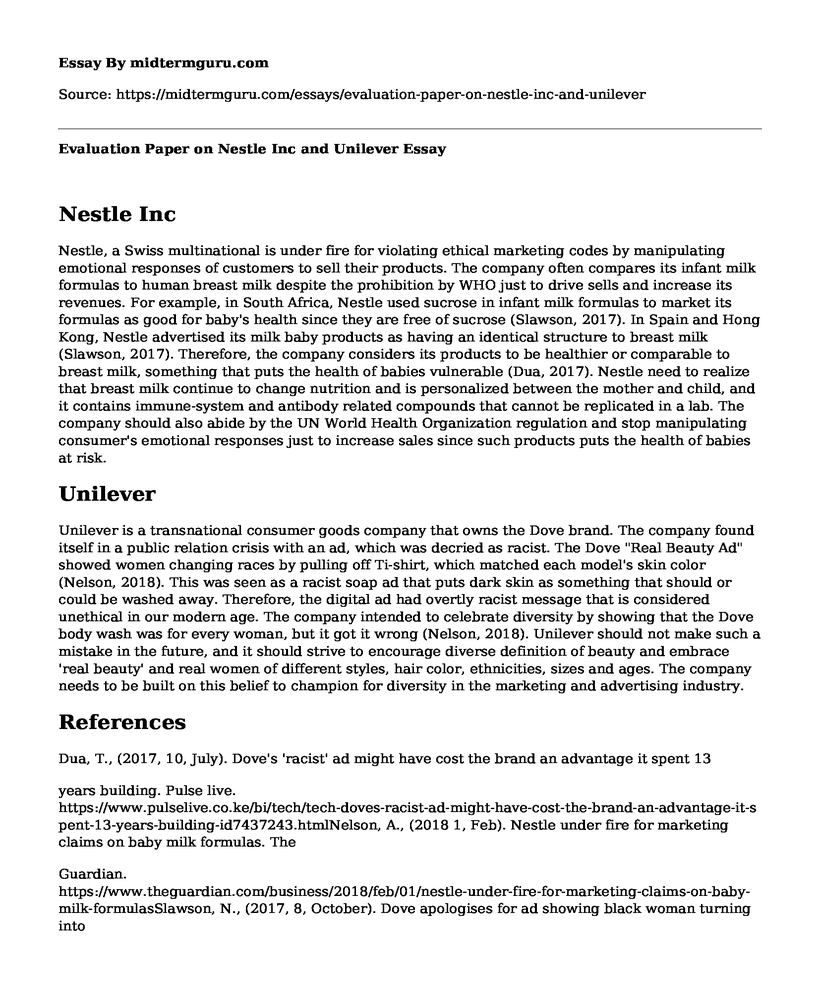Nestle Inc
Nestle, a Swiss multinational is under fire for violating ethical marketing codes by manipulating emotional responses of customers to sell their products. The company often compares its infant milk formulas to human breast milk despite the prohibition by WHO just to drive sells and increase its revenues. For example, in South Africa, Nestle used sucrose in infant milk formulas to market its formulas as good for baby's health since they are free of sucrose (Slawson, 2017). In Spain and Hong Kong, Nestle advertised its milk baby products as having an identical structure to breast milk (Slawson, 2017). Therefore, the company considers its products to be healthier or comparable to breast milk, something that puts the health of babies vulnerable (Dua, 2017). Nestle need to realize that breast milk continue to change nutrition and is personalized between the mother and child, and it contains immune-system and antibody related compounds that cannot be replicated in a lab. The company should also abide by the UN World Health Organization regulation and stop manipulating consumer's emotional responses just to increase sales since such products puts the health of babies at risk.
Unilever
Unilever is a transnational consumer goods company that owns the Dove brand. The company found itself in a public relation crisis with an ad, which was decried as racist. The Dove "Real Beauty Ad" showed women changing races by pulling off Ti-shirt, which matched each model's skin color (Nelson, 2018). This was seen as a racist soap ad that puts dark skin as something that should or could be washed away. Therefore, the digital ad had overtly racist message that is considered unethical in our modern age. The company intended to celebrate diversity by showing that the Dove body wash was for every woman, but it got it wrong (Nelson, 2018). Unilever should not make such a mistake in the future, and it should strive to encourage diverse definition of beauty and embrace 'real beauty' and real women of different styles, hair color, ethnicities, sizes and ages. The company needs to be built on this belief to champion for diversity in the marketing and advertising industry.
References
Dua, T., (2017, 10, July). Dove's 'racist' ad might have cost the brand an advantage it spent 13
years building. Pulse live. https://www.pulselive.co.ke/bi/tech/tech-doves-racist-ad-might-have-cost-the-brand-an-advantage-it-spent-13-years-building-id7437243.htmlNelson, A., (2018 1, Feb). Nestle under fire for marketing claims on baby milk formulas. The
Guardian. https://www.theguardian.com/business/2018/feb/01/nestle-under-fire-for-marketing-claims-on-baby-milk-formulasSlawson, N., (2017, 8, October). Dove apologises for ad showing black woman turning into
white one. The Guardian. https://www.theguardian.com/world/2017/oct/08/dove-apologises-for-ad-showing-black-woman-turning-into-white-one
Cite this page
Evaluation Paper on Nestle Inc and Unilever. (2022, Sep 23). Retrieved from https://midtermguru.com/essays/evaluation-paper-on-nestle-inc-and-unilever
If you are the original author of this essay and no longer wish to have it published on the midtermguru.com website, please click below to request its removal:
- Budweiser Company Overview
- How Does Germany Conduct International Business? - Paper Example
- Research Paper on NARS
- Sony's Financial Data: Assets, Liabilities, Cash Flow & More - Essay Sample
- Revolutionizing the Bicycle Market: Pro Bike's Initiative to Create Health-Conscious Communities - Essay Sample
- Partnerships to Solve Complex Societal Problems: A New Standard - Essay Sample
- Leadership Qualities: The Key to Success in Any Organization - Essay Sample







